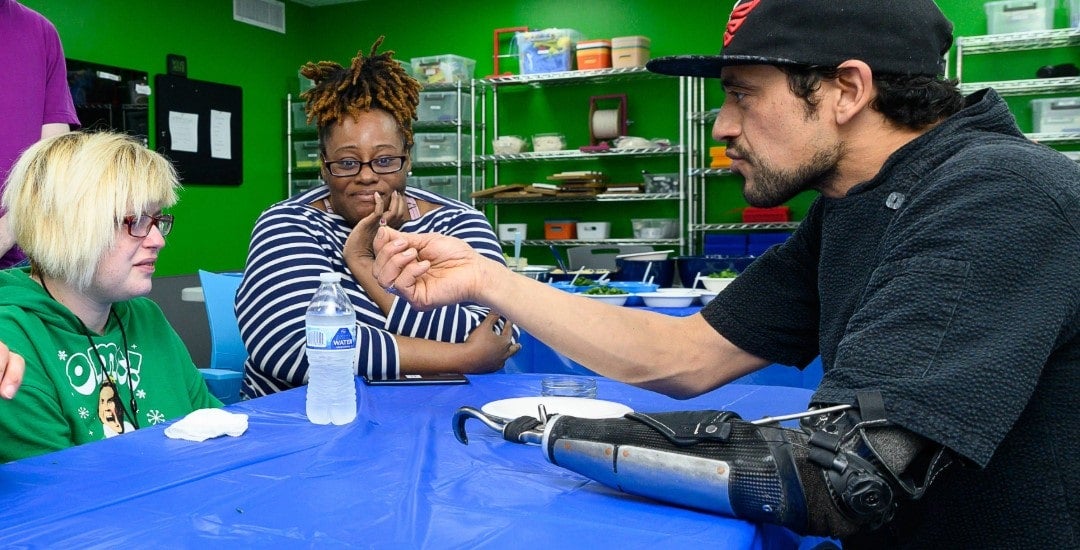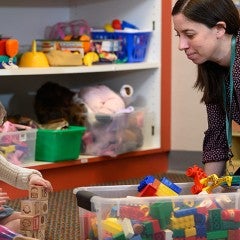Established in 1913, the agency’s work includes providing individuals and households with financial assistance, job training and mental health services, as well as supporting Holocaust survivors.
Clients of the Alexander Jewish Family Service come from all age groups, backgrounds and religious faiths throughout 10 ZIP codes in southwest and west Houston. The organization says it serves over 20,000 people annually.
In 2023, Alexander Jewish Family Service provided mental health first aid training and suicide prevention programs to over 2,000 people. Its career and employment center assisted 299 individuals with counseling. More than $1 million in home care subsidies helped Holocaust survivors.
Despite having clearly improved people’s lives, the organization was missing the data that truly illustrated its impact.
“We’re a relatively small organization,” said Carl Josehart, CEO of Alexander Jewish Family Service. “We don’t have a data analytics department, but understanding and using our data is very important to us. We want to ensure that we’re delivering the quality and experience that we want for our clients.
"It is also an important tool to help us tell the stories of the impact of the services we provide, so that funders understand the value proposition of investing in our work.”
Through a collaboration with the Kinder Institute for Urban Research and United Way of Greater Houston, Alexander Jewish Family Service has grown its skill in analyzing data and adopted practices to expand its use of data to continuously improve its services. The collaboration has strengthened the agency’s commitment to use evidence-based practices as one of its core values.
The partnership produced a case study, published in November, that included data-collection recommendations for Houston’s nonprofit community at large.
“It gave us some insight that we maybe suspected or knew already, but the Kinder Institute was able to really give us the insights of what some of our data and our metrics were,” said Laura Alter, manager of the career and employment center at Alexander Jewish Family Service. “Then, we were able to plan some actions around that.”
Josehart said philanthropists are increasingly interested in how their contributions are making a difference. With data that demonstrates impact, he believes individuals, foundations or other grantors are more likely to continue or increase their funding.
“They don’t want to just know that 20 people were taken care of,” he said. “They want to know if those 20 people are better off for having received the service. We’ve been a little slower than some industries in learning how to tell that story through data. As we have worked on that, we found that our funders are incredibly responsive. It’s been very powerful.”
Alter said it is important to have uniform data collection and data categorization from the start of a client’s interaction with the agency, in line with one of the case study’s recommendations.
“Each department has different needs, but there are questions that we can ask that are the same for every department,” Alter said. “We realized that we need to have standardized questions to collect the same data from every department.”
Another suggestion from the case study was to foster a data-oriented culture throughout the organization. The leadership of Alexander Jewish Family Service said data training and staff taking ownership of data and learning about its impact helps the organization use it most effectively.
“We want to get our staff excited about data, so they understand that it has a purpose and it all correlates with the work that we do,” said Morgan Zeringue, director of program services at Alexander Jewish Family Service. “Why does it drive the work that we do? How does it support funding to be able to do the work that they do?”
With enhanced data-collection abilities in place, Josehart said his hope is that the insights from the case study can benefit other nonprofit organizations in the Houston area.
“There’s a perception that nonprofit work is simplistic, and that we’re just out here as do-gooders,” Josehart said. “Our work and the work of the many other wonderful institutions in our community is highly complex.
“When we talked to the Kinder Institute team throughout the study, there were some ‘aha!’ moments about the complexity of our services. That was nice validation for us that this is hard stuff. It’s not so simple.”


